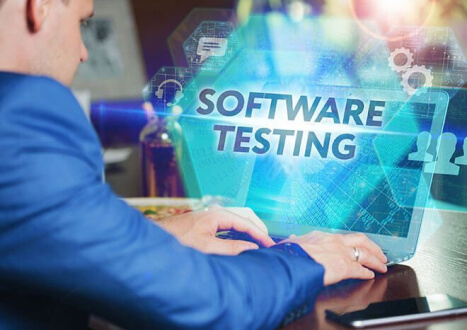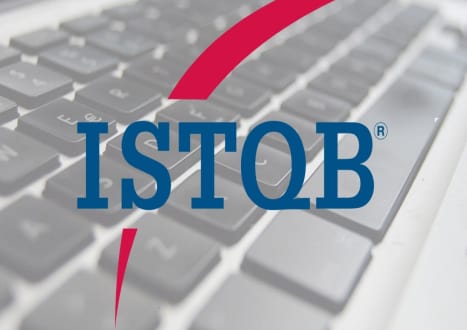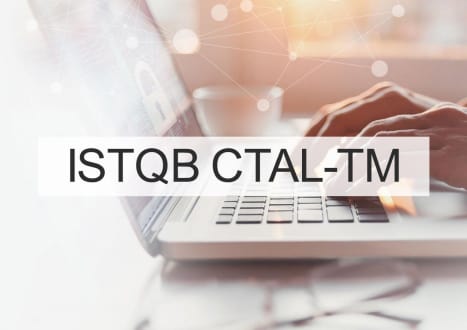- Home
- Video Courses
- Quality Assurance & Software Testing
- CTFL v4.0: Certified Tester Foundation Level (CTFL) v4.0 Dumps


CTFL v4.0: Certified Tester Foundation Level (CTFL) v4.0 Certification Video Training Course
CTFL v4.0: Certified Tester Foundation Level (CTFL) v4.0 Certification Video Training Course includes 110 Lectures which proven in-depth knowledge on all key concepts of the exam. Pass your exam easily and learn everything you need with our CTFL v4.0: Certified Tester Foundation Level (CTFL) v4.0 Certification Training Video Course.
Curriculum for ISTQB CTFL v4.0 Certification Video Training Course







CTFL v4.0: Certified Tester Foundation Level (CTFL) v4.0 Certification Video Training Course Info:
The Complete Course from ExamCollection industry leading experts to help you prepare and provides the full 360 solution for self prep including CTFL v4.0: Certified Tester Foundation Level (CTFL) v4.0 Certification Video Training Course, Practice Test Questions and Answers, Study Guide & Exam Dumps.
ISTQB Foundation Level Certification CTFL v4.0 & Practice Exams
Course Overview
The ISTQB Foundation Level certification is recognized globally as the first step for professionals who want to build a career in software testing. It establishes a fundamental understanding of the concepts, processes, and tools essential for quality assurance and testing activities. This certification ensures that candidates possess the necessary knowledge to effectively contribute to software testing projects and collaborate with development teams.
The ISTQB Foundation Level V4.0 represents the latest update in the syllabus, incorporating modern practices and methodologies in software testing. It covers the foundational knowledge required for various testing roles and is designed to prepare candidates for real-world testing challenges. By completing this course, learners gain a comprehensive overview of software testing principles, techniques, and lifecycle, which are critical for successful software delivery.
Purpose of the Course
The primary purpose of this course is to equip candidates with the skills and knowledge needed to pass the ISTQB Foundation Level exam confidently. It lays a solid foundation for those new to software testing, as well as for professionals seeking to formalize and validate their expertise with an internationally recognized certification.
This course also provides practical examples and practice exams to reinforce learning and improve test-taking skills. It enables candidates to understand the significance of software testing within the software development lifecycle and appreciate the roles and responsibilities involved.
Importance of ISTQB Certification in the Industry
Software testing is an essential component of quality assurance that ensures products meet user expectations and are free from critical defects. The ISTQB certification has become a global benchmark for testing professionals, offering a standardized approach to learning and demonstrating testing competence.
Many organizations and employers value ISTQB certification as it validates a candidate’s knowledge and commitment to best practices in testing. Holding this certification enhances career prospects, opens up new job opportunities, and can lead to higher salaries. Furthermore, ISTQB certification fosters a common understanding of testing principles across teams, improving communication and collaboration.
Course Delivery and Learning Methods
This course is delivered using a blend of theoretical explanations, real-world case studies, interactive exercises, and practice exams. It is designed to engage learners through detailed explanations of concepts followed by practical application scenarios. Candidates are encouraged to participate actively, reflect on their experiences, and apply the learning to their specific context.
The course also provides access to various learning materials including study guides, reference documents, sample questions, and mock exams. This multi-faceted approach ensures that learners not only understand the content but also develop confidence in their ability to apply knowledge under exam conditions.
Expected Outcomes
Upon completing the course, candidates will have a clear understanding of the core concepts of software testing, the testing lifecycle, and various testing techniques. They will be able to define the fundamental principles of testing, explain the purpose and benefits of different testing types, and describe common testing tools.
Participants will also be prepared to undertake the ISTQB Foundation Level exam with confidence. The course enables learners to critically analyze test conditions, design effective test cases, and understand the impact of testing on software quality. This foundational knowledge serves as a stepping stone for advanced certifications and further professional development.
Modules
Module 1: Fundamentals of Testing
This module introduces the basic concepts and definitions related to software testing. It emphasizes the importance of testing in the software development lifecycle and explains why defects occur and how they can be detected early.
The module begins with an overview of what testing is and why it is necessary, highlighting the objectives and principles that govern the testing process. It explains key terms such as error, defect, failure, and fault, providing clarity on the roles they play in software quality.
Learners will explore the different levels of testing, including unit testing, integration testing, system testing, and acceptance testing. This module also covers the seven fundamental testing principles, which guide effective testing practices and help prevent common mistakes.
Understanding the testing lifecycle is a core focus of this module. Learners will study the stages involved in planning, preparing, executing, and evaluating tests. This foundation enables learners to appreciate the structured approach required to ensure thorough testing coverage and traceability.
Module 2: Testing Throughout the Software Lifecycle
In this module, the course delves into how testing fits into various software development models and lifecycle frameworks. Candidates learn how testing activities are planned and executed in different contexts, including Agile, Waterfall, and V-model methodologies.
The module discusses the responsibilities of testers in each phase of the software lifecycle, from requirements gathering to deployment and maintenance. It emphasizes the importance of early testing and continuous integration to catch defects promptly and reduce overall project risk.
Additionally, this module explores the concept of test levels and test types in more detail, explaining how different tests serve different purposes depending on the project phase. It also introduces static testing techniques such as reviews and walkthroughs, which complement dynamic testing activities.
This comprehensive overview helps learners understand how testing aligns with software development goals and how it contributes to delivering high-quality software products.
Module 3: Static Techniques
Static testing techniques are covered extensively in this module. Unlike dynamic testing, which involves executing code, static testing is performed without running the software. The focus is on identifying defects early by examining code, requirements, and design documents.
The module covers various static techniques, including reviews, inspections, and walkthroughs. Learners will understand the process of conducting a review, the roles involved, and how to prepare effective review checklists.
Static analysis tools, which automate parts of the review process, are also introduced. The benefits of static techniques in reducing defects before code execution are highlighted, along with their role in improving overall software quality.
Candidates will gain knowledge of how to apply static techniques in practice, making testing more efficient and reducing the time and cost associated with defect detection.
Module 4: Test Design Techniques
One of the most critical modules, test design techniques, provides learners with methods to create effective test cases. The module is divided into categories covering both specification-based (black-box) and structure-based (white-box) techniques.
Specification-based techniques include equivalence partitioning, boundary value analysis, decision table testing, and state transition testing. These techniques help testers derive test cases from requirements or functional specifications without needing detailed knowledge of the internal code structure.
Structure-based techniques, such as statement testing and decision testing, focus on ensuring code coverage by examining the internal logic of the software. This module explains how these techniques complement each other to provide comprehensive test coverage.
The module also introduces experience-based techniques, which rely on tester expertise and intuition to identify potential defect areas. This practical approach is valuable when formal specifications are incomplete or unavailable.
Through examples and exercises, learners develop the skills needed to select and apply appropriate test design techniques for various scenarios.
Module 5: Test Management
Test management forms the backbone of organized testing activities. This module introduces candidates to planning, monitoring, and controlling test processes to ensure that testing objectives are met efficiently.
Topics covered include test planning, risk management, and estimation of testing effort. The module explains how to develop a test plan, define test objectives, and allocate resources effectively. It emphasizes the importance of communication and collaboration among stakeholders.
Test progress monitoring and control techniques are introduced to help manage issues, track defects, and adjust plans based on real-time feedback. The module also discusses the role of configuration management and test environment setup in supporting testing activities.
By understanding test management principles, learners gain the ability to coordinate testing efforts, ensure quality standards, and deliver reliable testing outcomes.
Module 6: Tools Support for Testing
The final module focuses on the use of tools to support testing activities. Candidates will learn about different categories of testing tools, including test management tools, test execution tools, and defect tracking tools.
The module discusses how tools can improve test efficiency, accuracy, and documentation. It highlights criteria for selecting appropriate tools and the challenges involved in tool adoption and integration.
Test automation is a key topic, covering the benefits, risks, and best practices associated with automating test cases. Candidates learn about scripting, automation frameworks, and how to evaluate automation opportunities.
This module prepares learners to leverage technology effectively to enhance their testing processes and achieve better outcomes.
Requirements of the Course
Educational Background and Prerequisites
The ISTQB Foundation Level course is designed to be accessible to a wide range of learners. While there are no strict formal educational prerequisites, a basic understanding of software development and computer operations is highly beneficial. Candidates with some prior experience in IT or software development will find the course material easier to grasp, but absolute beginners can also successfully complete the course with dedicated study.
Familiarity with fundamental software concepts such as what software is, how it is created, and the roles involved in software development projects can greatly enhance a candidate’s ability to understand testing processes and terminology. Basic computer literacy, including comfortable use of computers and software applications, is assumed.
The course does not require previous experience in software testing, as it introduces testing fundamentals from the ground up. However, candidates who have had exposure to testing activities or have worked in related roles such as quality assurance or business analysis will find that their background helps them quickly assimilate the material.
Time Commitment and Study Requirements
Candidates should anticipate investing a significant amount of time and effort into preparing for the ISTQB Foundation Level exam. The recommended study period varies based on individual experience and learning style, but typically ranges from 20 to 40 hours of focused study.
The course content is comprehensive, covering theoretical concepts, practical examples, and exam-style questions. To achieve mastery, candidates are encouraged to study all modules thoroughly, review practice questions regularly, and take multiple practice exams to build confidence and familiarity with the exam format.
Self-study alone can be effective, but many learners benefit from instructor-led training sessions, workshops, or online courses that provide additional guidance and interaction. A disciplined approach to scheduling study time, taking notes, and revisiting challenging topics is essential for success.
Technical Requirements for Course Participation
To access course materials and participate in practice exams, candidates need reliable access to a computer or mobile device with internet connectivity. Many training providers offer online platforms where study guides, videos, quizzes, and mock exams are available.
The course materials are designed to be compatible with common operating systems and browsers. Candidates should ensure their devices meet basic technical specifications to avoid disruptions during study sessions or exam simulations.
For learners participating in live or virtual instructor-led sessions, a stable internet connection and functioning audio/video capabilities are necessary. This setup allows for real-time interaction, questions, and feedback.
Some practice exam platforms may require installation of specific software or browser plugins. Candidates are advised to review these requirements in advance to ensure smooth access.
Language Proficiency and Communication Skills
Since the ISTQB Foundation Level exam and course materials are typically offered in English and several other languages, candidates should have a proficient command of the language in which they plan to study and take the exam.
Understanding technical terminology and instructions clearly is vital to comprehending course content and answering exam questions accurately. Candidates with limited proficiency may require additional language support or preparatory courses focusing on technical English.
Communication skills, both written and verbal, are valuable for engaging in discussions, completing assignments, and collaborating in group study sessions. These skills also enhance the ability to document and report testing results in real work environments.
Motivation and Learning Attitude
A positive and proactive learning attitude is one of the most important requirements for success in this course. Candidates must be motivated to understand the theory and practice of software testing deeply and apply this knowledge effectively.
The course demands consistent effort, critical thinking, and willingness to engage with sometimes complex or abstract concepts. Learners who actively participate, ask questions, and seek clarification tend to achieve better outcomes.
Curiosity about software quality, attention to detail, and analytical thinking contribute to grasping the material more effectively. Testing requires precision and thoroughness, and these traits should be nurtured during study.
Familiarity with Software Development Lifecycle
While the course introduces software testing in the context of the software development lifecycle, having prior knowledge of development methodologies enhances comprehension.
Understanding how software projects progress from requirements gathering through design, coding, testing, and deployment helps candidates see the role of testing more clearly. Awareness of common development models such as Waterfall, Agile, and DevOps provides context for testing activities.
Candidates without this background should allocate additional time to review software lifecycle concepts, as they form the framework within which testing occurs.
Access to Learning Resources
Candidates are expected to utilize a variety of learning resources to prepare adequately. These include the official ISTQB Foundation Level syllabus, study guides, training videos, and online forums.
Many organizations provide training packages that bundle these resources with instructor support and practice exams. Access to quality resources is crucial for thorough preparation.
Learners should be prepared to invest in acquiring or subscribing to these materials or seek out free and open educational resources that align with the ISTQB syllabus.
Practice and Exam Readiness
Success in the ISTQB Foundation Level exam is not solely dependent on theoretical knowledge but also on familiarity with the exam format and question types.
Candidates must dedicate time to completing practice exams under timed conditions to build endurance and exam-taking skills. Understanding how to analyze multiple-choice questions, eliminate distractors, and manage time effectively is essential.
Reviewing mistakes in practice tests and revisiting weak areas reinforces learning and helps identify topics needing further study.
Ethical Considerations and Professional Conduct
Although not always emphasized in entry-level courses, understanding the ethical responsibilities of testers is an important part of professional development.
Candidates should appreciate the importance of honesty, integrity, confidentiality, and respect for user privacy in testing activities. This mindset supports quality outcomes and builds trust within teams and with stakeholders.
Incorporating these professional values during study and practice prepares candidates for real-world testing roles where ethical decisions frequently arise.
Physical and Cognitive Requirements
The course requires sustained focus and cognitive engagement over extended periods. Candidates should ensure they have a conducive study environment free from distractions.
Good ergonomics, proper lighting, and regular breaks support physical comfort during study sessions. Maintaining mental alertness through healthy habits improves retention and application of knowledge.
Candidates with special needs or disabilities should seek accommodations from training providers to ensure equitable access to learning and assessment.
Commitment to Continuous Learning
The ISTQB Foundation Level certification represents a foundational step in a continuous learning journey. Candidates should be ready to pursue further certifications and stay updated with evolving testing practices.
This course encourages adopting a mindset of lifelong learning, where ongoing professional development is integral to career growth.
Candidates who embrace this philosophy benefit more from the initial certification and remain competitive in a rapidly changing industry.
Course Descriptions
Comprehensive Introduction to Software Testing
This course offers a thorough introduction to the field of software testing, starting from the very basics and building up to more complex concepts. It is structured to provide a solid foundation in the principles, methodologies, and practices that define modern software testing.
Learners will explore what testing means in the context of software development, why it is indispensable, and how it contributes to delivering high-quality products. The course discusses the lifecycle of testing activities, outlining the various stages from planning to execution and closure.
Through clear explanations and real-world examples, the course emphasizes the critical role testing plays in identifying defects early, reducing risks, and ensuring that software meets user requirements and expectations.
Detailed Exploration of Testing Techniques
A key feature of this course is the extensive coverage of different testing techniques used to design effective and efficient test cases. Participants will gain insights into specification-based techniques, which derive tests from functional requirements, and structure-based techniques, which focus on internal code structure.
The course also covers experience-based techniques, which leverage tester expertise and intuition to find defects that may not be obvious from formal specifications. Each technique is described in detail, including its applicability, strengths, and limitations.
By mastering these techniques, learners will be able to approach testing in a methodical way that balances thoroughness with practical constraints such as time and resources.
Testing Throughout the Software Development Lifecycle
The course integrates the concept of testing into the broader software development lifecycle. It explains how testing activities align with different development models like Waterfall, Agile, and DevOps.
Participants will learn how testing adapts to these models, the importance of early testing, and the continuous feedback loops that improve software quality. This understanding enables testers to work effectively within diverse project environments.
The course also highlights the roles and responsibilities of testers at various stages, emphasizing collaboration with developers, business analysts, and other stakeholders to achieve shared quality goals.
Focus on Test Management and Process Improvement
Beyond the technical aspects, the course addresses the organizational side of testing. It introduces test management principles, including planning, monitoring, and controlling testing activities.
Learners will understand how to develop test plans that align with project objectives, manage risks, and estimate effort. The course explores techniques for tracking progress, handling defects, and ensuring that testing delivers value.
Process improvement strategies are also discussed, enabling teams to refine their testing practices continually. This holistic view prepares candidates to contribute not only as testers but as quality advocates within their organizations.
Practical Use of Testing Tools
Recognizing the increasing importance of technology in testing, the course provides insights into various tools that support testing activities. It covers categories such as test management tools, test automation tools, and defect tracking systems.
Participants learn about selecting appropriate tools based on project needs, evaluating benefits and challenges, and integrating tools into workflows. The course also offers a practical perspective on test automation, including scripting basics and automation frameworks.
This hands-on knowledge empowers learners to leverage technology to enhance efficiency, accuracy, and repeatability in testing processes.
Inclusion of Practice Exams and Exam Strategies
To support exam readiness, the course incorporates multiple practice exams that mirror the ISTQB Foundation Level test format. These exams provide opportunities to apply knowledge, assess understanding, and identify areas for improvement.
Candidates receive guidance on exam strategies, such as time management, question analysis, and techniques for handling difficult or ambiguous questions. This preparation reduces exam anxiety and builds confidence.
Regular practice tests also help reinforce learning, making the transition from study to certification smoother and more effective.
Emphasis on Industry Standards and Best Practices
The course content is aligned with ISTQB standards and best practices recognized globally. It ensures that learners receive up-to-date information that reflects current trends and methodologies in software testing.
Emphasizing adherence to established standards supports consistent quality and facilitates communication among professionals across organizations and countries.
The course encourages learners to adopt best practices not only for exam success but to foster excellence in their testing careers.
Flexibility in Learning Pathways
This course is designed to accommodate different learning styles and paces. It is suitable for self-paced study as well as structured classroom or virtual learning environments.
Materials include detailed textual content, illustrative examples, interactive exercises, and multimedia resources. This diversity supports engagement and helps reinforce concepts through varied modes of learning.
Candidates can tailor their study plans based on personal schedules, prior experience, and preferred learning methods.
Who This Course Is For
Aspiring Software Testers and Quality Assurance Professionals
This course is ideal for individuals who are seeking to start a career in software testing or quality assurance. It provides the essential knowledge and skills needed to enter the field with confidence.
For those new to the industry, the course offers a structured pathway to understanding the fundamentals of testing, terminology, and methodologies that are critical for job readiness.
It serves as a stepping stone for further professional development and higher-level certifications.
Software Developers and Programmers
Developers and programmers who wish to deepen their understanding of testing will benefit greatly from this course. By gaining insight into testing principles and techniques, developers can write more testable code and collaborate more effectively with testing teams.
Understanding testing perspectives helps developers identify defects earlier and contributes to producing higher-quality software.
This knowledge supports a culture of quality within development teams and enhances the overall software development lifecycle.
Project Managers and Business Analysts
Project managers and business analysts involved in software development projects will find this course valuable for gaining an overview of testing activities and how they integrate with project workflows.
Understanding testing processes enables these professionals to plan projects more effectively, allocate resources appropriately, and communicate testing progress and risks to stakeholders.
It also enhances collaboration between teams by providing a common language and shared understanding of quality goals.
Professionals Seeking International Certification
Individuals aiming to obtain an internationally recognized certification in software testing will find this course perfectly aligned with the ISTQB Foundation Level exam syllabus.
Whether for career advancement, personal growth, or organizational requirements, this course equips candidates with the knowledge and exam skills needed to achieve certification.
The certification opens doors to global job markets and validates professional competence.
Quality Assurance and Testing Team Members
Current members of QA or testing teams who want to formalize their expertise or refresh their knowledge will benefit from this course.
It helps standardize understanding within teams, improves testing consistency, and introduces updated practices based on the latest ISTQB syllabus.
Teams aiming for process improvement and certification-based recognition can leverage this course to enhance overall performance.
IT Professionals Transitioning to Testing Roles
IT professionals working in roles such as support, operations, or technical analysis who want to transition into software testing will find this course accessible and comprehensive.
It bridges knowledge gaps and provides foundational skills needed to succeed in testing roles.
The course also supports career mobility and diversification within the IT domain.
Students and Recent Graduates
Students and recent graduates in computer science, information technology, or related fields can use this course as a practical introduction to software testing.
It complements academic knowledge with industry-relevant skills and certification preparation.
This course enhances employability by providing recognized credentials and practical competencies.
Individuals Interested in Quality Improvement
Anyone interested in understanding how software quality is ensured and how testing contributes to better products and services can benefit from this course.
It demystifies testing processes and highlights their impact on customer satisfaction and business success.
This broader perspective supports roles beyond testing, including product management and customer support.
Organizations Supporting Employee Development
Companies aiming to develop their workforce’s skills in software testing can use this course as part of their training programs.
It standardizes knowledge across teams, supports certification goals, and promotes a culture of quality.
Investing in employee development through this course leads to improved project outcomes and competitive advantage.
Student Feedback
Similar ISTQB Video Courses









Only Registered Members Can Download VCE Files or View Training Courses
Please fill out your email address below in order to Download VCE files or view Training Courses. Registration is Free and Easy - you simply need to provide an email address.
- Trusted By 1.2M IT Certification Candidates Every Month
- VCE Files Simulate Real Exam Environment
- Instant Download After Registration.
Log into your ExamCollection Account
Please Log In to download VCE file or view Training Course
Only registered Examcollection.com members can download vce files or view training courses.




